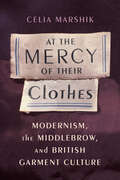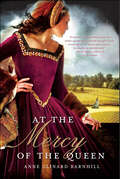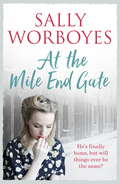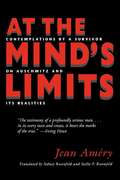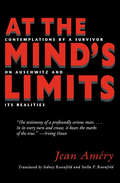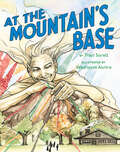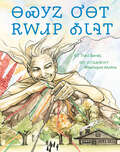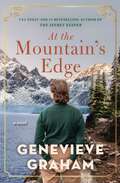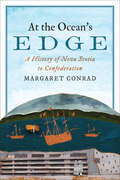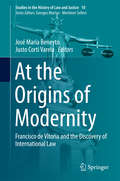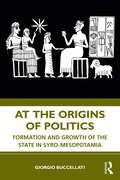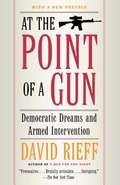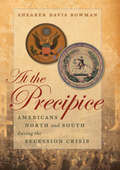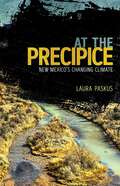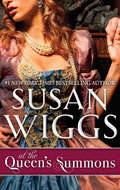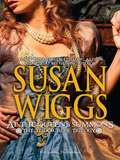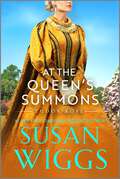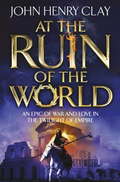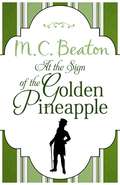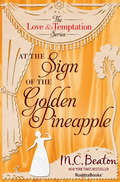- Table View
- List View
At the Mercy of Their Clothes: Modernism, the Middlebrow, and British Garment Culture (Modernist Latitudes)
by Celia MarshikIn much of modern fiction, it is the clothes that make the character. Garments embody personal and national histories. They convey wealth, status, aspiration, and morality (or a lack thereof). They suggest where characters have been and where they might be headed, as well as whether or not they are aware of their fate. At the Mercy of Their Clothes explores the agency of fashion in modern literature, its reflection of new relations between people and things, and its embodiment of a rapidly changing society confronted by war and cultural and economic upheaval. In some cases, people need garments to realize themselves. In other cases, the clothes control the person who wears them. <P><P> Celia Marshik's study combines close readings of modernist and middlebrow works, a history of Britain in the early twentieth century, and the insights of thing theory. She focuses on four distinct categories of modern clothing: the evening gown, the mackintosh, the fancy dress costume, and secondhand attire. In their use of these clothes, we see authors negotiate shifting gender roles, weigh the value of individuality during national conflict, work through mortality, and depict changing class structures. <P><P>Marshik's dynamic comparisons put Ulysses in conversation with Rebecca, Punch cartoons, articles in Vogue, and letters from consumers, illuminating opinions about specific garments and a widespread anxiety that people were no more than what they wore. Throughout her readings, Marshik emphasizes the persistent animation of clothing—and objectification of individuals—in early-twentieth-century literature and society. She argues that while artists and intellectuals celebrated the ability of modern individuals to remake themselves, a range of literary works and popular publications points to a lingering anxiety about how political, social, and economic conditions continued to constrain the individual.
At the Mercy of the Queen: A Novel of Anne Boleyn
by Anne Clinard BarnhillA sweeping tale of sexual seduction and intrigue at the court of Henry VIII, At the Mercy of the Queen is a rich and dramatic debut historical about Madge Shelton, cousin and lady-in-waiting to Anne Boleyn.At the innocent age of fifteen, Lady Margaret Shelton arrives at the court of Henry VIII and quickly becomes the confidante of her cousin, Queen Anne Boleyn. But she soon finds herself drawn into the perilous web of Anne's ambition.Desperate to hold onto the king's waning affection, Anne schemes to have him take her guileless young cousin as mistress, ensuring her husband's new paramour will owe her loyalty to the queen. But Margaret has fallen deeply in love with a handsome young courtier. She is faced with a terrible dilemma: give herself to the king and betray the love of her life or refuse to become his mistress and jeopardize the life of the her cousin, Queen Anne. "A stunningly engrossing and fast read; historical fiction readers will snatch it up and shout, ‘Thank you!'"—Library Journal (starred review)
At the Mile End Gate: A romantic saga full of life and set against a dramatic backdrop
by Sally Worboyes'She brings the East End to life' Barbara WindsorThe Second World War is over and the troops are coming home - but so much has changed . . . The war is over and the soldiers are coming back to the bomb-ravaged East End. Tom Smith is one of the thousands who are returning home. It's been an eventful war, what with a spell of desertion, and Tom can't wait to see his wife Jessie, their son Billy and the new baby daughter he hasn't even laid eyes on.But life back home wasn't easy either, especially when Jessie's army pension was stopped. So when she was told to put Emma-Rose into a home for her own good, she thought it was best. But how will Tom take the news? There is worse to come, when Tom learns that Jessie's old boyfriend has been helping her during the war.A compelling family saga set in the aftermath of the Second World War, perfect for fans of Nadine Dorries, Katie Flynn and Kitty Neale.
At the Mile End Gate: A romantic saga full of life and set against a dramatic backdrop
by Sally Worboyes'She brings the East End to life' Barbara WindsorThe Second World War is over and the troops are coming home - but so much has changed . . . The war is over and the soldiers are coming back to the bomb-ravaged East End. Tom Smith is one of the thousands who are returning home. It's been an eventful war, what with a spell of desertion, and Tom can't wait to see his wife Jessie, their son Billy and the new baby daughter he hasn't even laid eyes on.But life back home wasn't easy either, especially when Jessie's army pension was stopped. So when she was told to put Emma-Rose into a home for her own good, she thought it was best. But how will Tom take the news? There is worse to come, when Tom learns that Jessie's old boyfriend has been helping her during the war.A compelling family saga set in the aftermath of the Second World War, perfect for fans of Nadine Dorries, Katie Flynn and Kitty Neale.
At the Mind's Limits: Contemplations by a Survivor on Auschwitz and Its Realities
by Jean Amery Sidney Rosenfeld Stella P. Rosenfeld"These are pages that one reads with almost physical pain. . . all the way to its stoic conclusion. " --Primo Levi "The testimony of a profoundly serious man. . . . In its every turn and crease, it bears the marks of the true. " --Irving Howe, New Republic "This remarkable memoir. . . is the autobiography of an extraordinarily acute conscience. With the ear of a poet and the eye of a novelist, Amery vividly communicates the wonder of a philosopher--a wonder here aroused by the 'dark riddle' of the Nazi regime and its systematic sadism. " --Jim Miller, Newsweek "Whoever has succumbed to torture can no longer feel at home in the world. The shame of destruction cannot be erased. Trust in the world, which already collapsed in part at the first blow, but in the end, under torture, fully, will not be regained. That one's fellow man was experienced as the antiman remains in the tortured person as accumulated horror. It blocks the view into a world in which the principle of hope rules. One who was martyred is a defenseless prisoner of fear. It is fear that henceforth reigns over him. " --Jean Amery At the Mind's Limits is the story of one man's incredible struggle to understand the reality of horror. In five autobiographical essays, Amery describes his survival--mental, moral, and physical--through the enormity of the Holocaust. Above all, this masterful record of introspection tells of a young Viennese intellectual's fervent vision of human nature and the betrayal of that vision.
At the Mind's Limits: Contemplations by a Survivor on Auschwitz and Its Realities
by Jean AméryThis searing memoir of the author&’s concentration camp experience &“is the autobiography of an extraordinarily acute conscience&” (Newsweek). &“Whoever has succumbed to torture can no longer feel at home in the world.&” At the Mind&’s Limits is the story of one man&’s incredible struggle to understand the reality of horror. In five autobiographical essays, Amery describes his survival—mental, moral, and physical—through the enormity of the Holocaust. Above all, this masterful record of introspection tells of a young Viennese intellectual&’s fervent vision of human nature and the betrayal of that vision. &“These are pages that one reads with almost physical pain . . . all the way to its stoic conclusion.&” —Primo Levi &“The testimony of a profoundly serious man. . . . In its every turn and crease, it bears the marks of the true.&” —Irving Howe, The New Republic
At the Mountain's Base
by Traci SorellA family, separated by duty and distance, waits for a loved one to return home in this lyrical picture book celebrating the bonds of a Cherokee family and the bravery of history-making women pilots.At the mountain's base sits a cabin under an old hickory tree. And in that cabin lives a family -- loving, weaving, cooking, and singing. The strength in their song sustains them through trials on the ground and in the sky, as they wait for their loved one, a pilot, to return from war. With an author's note that pays homage to the true history of Native American U.S. service members like WWII pilot Ola Mildred "Millie" Rexroat, this is a story that reveals the roots that ground us, the dreams that help us soar, and the people and traditions that hold us up.
At the Mountain's Base (Cherokee edition)
by Traci SorellA family, separated by duty and distance, waits for a loved one to return home in this lyrical picture book celebrating the bonds of a Cherokee family and the bravery of history-making women pilots. Now available in Cherokee. At the mountain's base sits a cabin under an old hickory tree. And in that cabin lives a family -- loving, weaving, cooking, and singing. The strength in their song sustains them through trials on the ground and in the sky, as they wait for their loved one, a pilot, to return from war.With an author's note that pays homage to the true history of Native American U.S. service members like WWII pilot Ola Mildred "Millie" Rexroat, this is a story that reveals the roots that ground us, the dreams that help us soar, and the people and traditions that hold us up.
At the Mountain's Edge
by Genevieve GrahamFrom bestselling author Genevieve Graham comes a sweeping new historical novel of love, tragedy, and redemption set during the height of the Klondike Gold Rush.In 1897, the discovery of gold in the desolate reaches of the Yukon has the world abuzz with excitement, and thousands of prospectors swarm to the north seeking riches the likes of which have never been seen before. For Liza Peterson and her family, the gold rush is a chance for them to make a fortune by moving their general store business from Vancouver to Dawson City, the only established town in the Yukon. For Constable Ben Turner, a recent recruit of the North-West Mounted Police, upholding the law in a place overrun with guns, liquor, prostitutes, and thieves is an opportunity to escape a dark past and become the man of integrity he has always wanted to be. But the long, difficult journey over icy mountain passes and whitewater rapids is much more treacherous than Liza or Ben imagined, and neither is completely prepared for the forbidding north. As Liza’s family nears the mountain’s peak, a catastrophe strikes with fatal consequences, and not even the NWMP can help. Alone and desperate, Liza finally reaches Dawson City, only to find herself in a different kind of peril. Meanwhile, Ben, wracked with guilt over the accident on the trail, sees the chance to make things right. But just as love begins to grow, new dangers arise, threatening to separate the couple forever. Inspired by history as rich as the Klondike’s gold, At the Mountain’s Edge is an epic tale of romance and adventure about two people who must let go of the past not only to be together, but also to survive.
At the Ocean's Edge: A History of Nova Scotia to Confederation (Studies in Atlantic Canada History)
by Margaret ConradAt the Ocean’s Edge offers a vibrant account of Nova Scotia’s colonial history, situating it in an early and dramatic chapter in the expansion of Europe. Between 1450 and 1850, various processes – sometimes violent, often judicial, rarely conclusive – transferred power first from Indigenous societies to the French and British empires, and then to European settlers and their descendants who claimed the land as their own. This book not only brings Nova Scotia’s struggles into sharp focus but also unpacks the intellectual and social values that took root in the region. By the time that Nova Scotia became a province of the Dominion of Canada in 1867, its multicultural peoples, including Mi’kmaq, Acadian, African, and British, had come to a grudging, unequal, and often contested accommodation among themselves. Written in accessible and spirited prose, the narrative follows larger trends through the experiences of colourful individuals who grappled with expulsion, genocide, and war to establish the institutions, relationships, and values that still shape Nova Scotia’s identity.
At the Origins of Modernity: Francisco de Vitoria and the Discovery of International Law (Studies in the History of Law and Justice #10)
by José María Beneyto Justo Corti VarelaThis book is based on an international project conducted by the Institute for European Studies of the University CEU San Pablo in Madrid and a seminar on Vitoria and International Law which took place on July 2nd 2015 in the convent of San Esteban, the place where Vitoria spent his most productive years as Chair of Theology at the University of Salamanca. It argues that Vitoria not only lived at a time bridging the Middle Ages and Modernity, but also that his thoughts went beyond the times he lived in, giving us inspiration for meeting current challenges that could also be described as "modern" or even post-modern. There has been renewed interest in Francisco de Vitoria in the last few years, and he is now at the centre of a debate on such central international topics as political modernity, colonialism, the discovery of the "Other" and the legitimation of military interventions. All these subjects include Vitoria's contributions to the formation of the idea of modernity and modern international law. The book explores two concepts of modernity: one referring to the post-medieval ages and the other to our times. It discusses the connections between the challenges that the New World posed for XVIth century thinkers and those that we are currently facing, for example those related to the cyberworld. It also addresses the idea of international law and the legitimation of the use of force, two concepts that are at the core of Vitoria's texts, in the context of "modern" problems related to a multipolar world and the war against terrorism. This is not a historical book on Vitoria, but a very current one that argues the value of Vitoria's reflections for contemporary issues of international law.
At the Origins of Politics: Formation and Growth of the State in Syro-Mesopotamia
by Giorgio BuccellatiThis volume, now available in English, explores how Mesopotamia’s urban revolution in the late fourth millennium B.C. shaped a new mentality, leading to new forms of social interaction, and to the development of the state, its laws and its religion to consolidate new managerial hierarchies in the region.How is it that the phenomenon of the state, a society structured along lines of power that frame individuals in a new supra-organism, suddenly came into being during the fourth millennium B.C.? In this book, Buccellati explores the emergence of statehood and power structures in ancient Mesopotamia against the background of the long prehistoric period. It was the arena in which the earliest cities and states were born and that offers us the first and richest documentation of the development of political life in antiquity. This book provides rich documentation of the causes that led to the formation of the territorial state, tracing its evolution from city-states to universal empires from ca 3500 B.C. to 500 B.C. At the same time, it examines the tension between individual rights and supra-personal systems of power during this period and explores new forms of social interaction that coincided with the economic dimension of the urban revolution. This paradigmatic history, newly translated into English for Anglophone readers, offers a key to understanding modern political forms and their transformations.At the Origins of Politics provides a thorough examination of the development of the state in ancient Mesopotamia, suitable for students, scholars, and researchers working on Near Eastern history and society, and ancient societies and politics more broadly.
At the Piano with Fauré
by Marguerite LongThe virtuoso pianist and teacher, Marguerite Long, was a great friend of Fauré and the foremost interpreter of his music.
At the Point of a Gun: Democratic Dreams and Armed Intervention
by David RieffWriting from the front lines of the hot wars of the post-Cold War world -- the Balkans, Africa, the Middle East, and most recently Afghanistan and Iraq for The New York Times Magazine -- David Rieff witnessed firsthand most of the armed interventions waged by the West or the United Nations in the name of human rights and democratization. His report is anything but reassuring. In this timely collection of his most illuminating articles, Rieff, one of our leading experts on the subject, reassesses some of his own judgments about the use of military might to solve the world's most pressing humanitarian problems and curb the world's cruelest human rights abusers, presenting what, taken as a whole, is a thoughtful and impassioned argument against armed intervention in all but the most extreme cases. At the Point of a Gun raises critical questions we cannot ignore in this era of gunboat democracy. When, if ever, is it appropriate to intervene militarily in the domestic affairs of other nations? Are human rights and humanitarian concerns legitimate reasons for intervening, or is the assault on sovereignty -- sovereignty that is as much an article of faith at the UN as it is in Washington -- a flag of convenience for the recolonization of part of the world? What role should the United Nations play in alleviating humanitarian crises? And, above all, can democracy be imposed through the barrel of an M16?Collected here for the first time, Rieff's essays draw a searing portrait of what happens when the grandiose schemes of policymakers and the grandiose ethical ambitions of human rights activists go horribly wrong in the field. Again and again, they ask the question: Do these moral ambitions of ours to protect people from massacre and want match either our means or our wisdom? Rieff's articles appear as they were written. Some, however, are accompanied by brief reconsiderations in which the author describes how and why his thinking has changed both as he has reflected on what it means, as in Iraq, to impose democracy by force, and as he has witnessed, firsthand, what that redemptive project actually looks like in practice. This is not an optimistic report. To the contrary, it is the chastened conclusion of a writer who was once one of the leading advocates of such interventions. But the questions Rieff raises are of the essence as the United States grapples with the harsh consequences of what it has wrought on the ground in Afghanistan and Iraq.
At the Precipice: Americans North and South during the Secession Crisis
by Shearer Davis BowmanWhy did eleven slave states secede from the Union in 1860-61? Why did the eighteen free states loyal to the Union deny the legitimacy of secession, and take concrete steps after Fort Sumter to subdue what President Abraham Lincoln deemed treasonous rebellion? At the Precipice seeks to answer these and related questions by focusing on the different ways in which Americans, North and South, black and white, understood their interests, rights, and honor during the late antebellum years. Rather than give a narrative account of the crisis, Shearer Davis Bowman takes readers into the minds of the leading actors, examining the lives and thoughts of such key figures as Abraham Lincoln, James Buchanan, Jefferson Davis, John Tyler, and Martin Van Buren. Bowman also provides an especially vivid glimpse into what less famous men and women in both sections thought about themselves and the political, social, and cultural worlds in which they lived, and how their thoughts informed their actions in the secession period. Intriguingly, secessionists and Unionists alike glorified the Declaration of Independence and the Constitution of the United States, yet they interpreted those sacred documents in markedly different ways and held very different notions of what constituted "American" values.
At the Precipice: New Mexico's Changing Climate
by Laura PaskusAt the Precipice explores the question many of us have asked ourselves: What kind of world are we leaving to our children? The realities of climate change consume the media and keep us up at night worrying about the future. But in New Mexico and the larger Southwest, climate change has been silently wreaking havoc: average temperatures in the Upper Rio Grande Basin are increasing at double the global average, super fires like Las Conchas have devastated mountains, and sections of the Rio Grande are drying up.Laura Paskus has tracked the issues of climate change at both the state and federal levels. She shares the frightening truth, both in terms of what is happening in nature and what is not happening to counteract the mounting crisis. She writes, &“I wonder about the coming world. Which trees will grow, which birds will have survived. . . . The door to that new world has opened. And there&’s no going back.&” And yet our future is not yet determined—or is it?
At the Queen's Summons
by Susan WiggsTravel back to the glittering Tudor court with #1 New York Times bestselling author Susan Wiggs in her beloved Tudor Rose Trilogy.Feisty orphan Pippa de Lacey lives by wit and skill as a London street performer. But when her sharp tongue gets her into serious trouble, she throws herself upon the mercy of Irish chieftain Aidan O’Donoghue. Pippa provides a welcome diversion for Aidan as he awaits an audience with the queen, who holds his people’s fate in her hands. Amused at first, he becomes obsessed with the audacious waif who claims his patronage. Rash and impetuous, their unlikely alliance reverberates with desire and the tantalizing promise of a life each has always wanted—but never dreamed of attaining.Originally published in 2009.
At the Queen's Summons (Tudor Rose #3)
by Susan WiggsFeisty orphan Pippa de Lacey lives by wit and skill as a London street performer. But when her sharp tongue gets her into serious trouble, she throws herself upon the mercy of Irish chieftain Aidan O'Donoghue.Pippa provides a welcome diversion for Aidan as he awaits an audience with the queen, who holds his people's fate in her hands. Amused at first, he becomes obsessed with the audacious waif who claims his patronage.Rash and impetuous, their unlikely alliance reverberates with desire and the tantalizing promise of a life each has always wanted-but never dreamed of attaining.
At the Queen's Summons (Tudor Rose #3)
by Susan WiggsIn this riveting conclusion to the Tudor Rose trilogy, #1 New York Times bestselling author Susan Wiggs draws readers into the lives of a witty street performer, a chivalrous Irishman, and the passionate alliegance that blossoms between them. Feisty orphan Pippa de Lacey lives by wit and skill as a London street performer. But when her sharp tongue gets her into serious trouble, she throws herself upon the mercy of Irish chieftain Aidan O'Donoghue.Pippa provides a welcome diversion for Aidan as he awaits an audience with the queen, who holds his people's fate in her hands. Amused at first, he becomes obsessed with the audacious waif who claims his patronage.Rash and impetuous, their unlikely alliance reverberates with desire and the tantalizing promise of a life each has always wanted—but never dreamed of attaining.Books in the Tudor Rose Trilogy:At the King's CommandThe Maiden's HandAt the Queen's SummonsPreviously published.
At the Roots of Italian Identity: 'Race' and 'Nation' in the Italian Risorgimento, 1796-1870 (Routledge Studies in the Modern History of Italy)
by Edoardo Marcello BarsottiThis book investigates the relationship between the ideas of nation and race among the nationalist intelligentsia of the Italian Risorgimento and argues that ideas of race played a considerable role in defining Italian national identity. The author argues that the racialization of the Italians dates back to the early Napoleonic age and that naturalistic racialism—or race-thinking based on the taxonomies of the natural history of man—emerged well before the traditionally presumed date of the late 1860s and the advent of positivist anthropology. The book draws upon a wide number of sources including the work of Vincenzo Cuoco, Giuseppe Micali, Adriano Balbi, Alessanro Manzoni, Giandomenico Romagnosi, Cesare Balbo, Vincenzo Gioberti, and Carlo Cattaneo. Themes explored include links to antiquity on the Italian peninsula, archaeology, and race-thinking.
At the Ruin of the World
by John Henry ClayA.D. 448. The Roman Empire is crumbling.The Emperor is weak. Countless Romans live under the rule of barbarian kings. Politicians scheme and ambitious generals vie for power. Then from the depths of Germany arises an even darker threat: Attila, King of the Huns, gathering his hordes and determined to crush Rome once and for all.In a time of danger and deception, where every smile conceals betrayal and every sleeve a dagger, three young people hold onto the dream that Rome can be made great once more. But as their fates collide, they find themselves forced to survive in a world more deadly than any of them could ever have imagined. What can they possibly do to save the Empire, or themselves, from destruction?
At the Seven Stars
by Patricia Beatty John BeattyRichard Larkin, fifteen-year-old orphan from Philadelphia, thought his luck had changed when the famous literary figure Samuel Johnson found him work at an "eating house" called the Seven Stars. As a Colonial, ignorant of the secret Jacobite movement to dethrone King George II, Richard was puzzled by the guarded political conversations at the tavern. Then one night, while serving a gathering of aristocratic men clad in silks and satins, he overhears a dark plot, coded with mysterious names and allusions —and witnesses the cold-blooded murder of the one dissenting voice. The story moves on, as swiftly and as deftly as the spies and counter-spies who hunt Richard down, involving him deeper and deeper in their dangerous and separate causes. Samuel Johnson, William Hogarth and David Garrick come alive in flesh and blood terms as Richard moves in and out of the intrigues of the famous Elibank Plot of 1752. Re-created in full costume, are the lords and ladies, the street urchins, the men of arts and letters, who peopled the flowering of the Age of Reason. With cloak-and-dagger overtones, a history adventure that is vivid, authentic, and hard to put down.
At the Sign of the Golden Pineapple (Regency Season #3)
by M.C. Beaton'I DO NOT THINK I WANT TO BE MARRIED AT ALL. I WANT TO BE RICH. VERY RICH?.'Miss Henrietta Bascombe's closest of friends chums gasped to hear of such a well-bred lady talk of going into trade, but Henrietta was determined to turn her pittance of an inheritance into a fortune by opening a London sweet shop that would rival the famous Gunther's! Undaunted by a challenge, Henrietta proceeded to hang out the traditional confectioners sign of a golden pineapple and soon earned the custom of the entire haute ton. That is, until the proud Earl of Carrisdowne took exception to his younger brother and his best friend ogling the girls behind Bascombe's counter. It was clear to the earl that Miss Bascombe would have to be put out of business and soon. But the earl looked forward to tangling with the fiery-eyed proprietor much more than he was willing to admit.
At the Sign of the Golden Pineapple (The Love and Temptation Series #2)
by M. C. BeatonA lady’s sensational sweet shop causes a scandal among the ton in this Regency romance by the New York Times–bestselling author.When Miss Henrietta Bascombe decides to eschew marriage in pursuit of a trade, the pronouncement causes quite a stir. But Henrietta is determined to turn her pittance of an inheritance into a fortune. And she plans to do so by opening a London sweet shop to rival the famous Gunther's! Hanging out her shingle—the traditional confectioners sign of a golden pineapple—Henrietta soon earns the custom of the entire ton. But the proud Earl of Carrisdowne takes exception to his younger brother ogling the girls behind Bascombe's counter. The earl intends to see Miss Bascombe close up shop and soon. But the more he tangles with the fiery-eyed proprietor, the more he finds her as irresistible as her famous treats . . .
